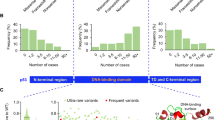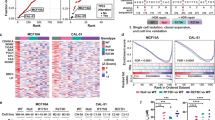Mutations in the p53 gene occur in diverse human tumour types (original) (raw)
- Letter
- Published: 07 December 1989
- Suzanne J. Baker1,
- Antonette C. Preisinger1,
- J. Milburn Jessup2,
- Richard Hosteller2,
- Karen Cleary2,
- Sandra H. Signer3,
- Nancy Davidson1,
- Stephen Baylin1,
- Peter Devilee4,
- Thomas Glover5,
- Francis S. Collins5,
- Ainsley Weslon6,
- Rama Modali6,
- Curtis C. Harris6 &
- …
- Bert Vogelstein1 na1
Nature volume 342, pages 705–708 (1989)Cite this article
- 3798 Accesses
- 2929 Citations
- 24 Altmetric
- Metrics details
Abstract
THE p53 gene has been a constant source of fascination since its discovery nearly a decade ago1,2. Originally considered to be an oncogene, several convergent lines of research have indicated that the wild-type gene product actually functions as a tumour suppressor gene3–9. For example, expression of the neoplastic phenotype is inhibited, rather than promoted, when rat cells are transfected with the murine wild-type p53 gene together with mutant p53 genes and/or other oncogenes3,4. Moreover, in human tumours, the short arm of chromosome 17 is often deleted (reviewed in ref. 10). In colorectal cancers, the smallest common region of deletion is centred at 17pl3.1 (ref. 9); this region harbours the p53 gene, and in two tumours examined in detail, the remaining (non-deleted) p53 alleles were found to contain mutations9. This result was provocative because allelic deletion coupled with mutation of the remaining allele is a theoretical hallmark of tumour-suppressor genes11. In the present report, we have attempted to determine the generality of this observation; that is, whether tumours with allelic deletions of chromosome 17p contain mutant p53 genes in the allele that is retained. Our results suggest that (1) most tumours with such allelic deletions contain p53 point mutations resulting in amino-acid substitutions, (2) such mutations are not confined to tumours with allelic deletion, but also occur in at least some tumours that have retained both parental 17p alleles, and (3) p53 gene mutations are clustered in four 'hot-spots' which exactly coincide with the four most highly conserved regions of the gene. These results suggest that p53 mutations play a role in the development of many common human malignancies.
This is a preview of subscription content, access via your institution
Access options
Subscribe to this journal
Receive 51 print issues and online access
$199.00 per year
only $3.90 per issue
Buy this article
- Purchase on SpringerLink
- Instant access to full article PDF
Prices may be subject to local taxes which are calculated during checkout
Additional access options:
Similar content being viewed by others


TP53: the unluckiest of genes?
Article Open access 23 October 2024

References
- Lane, D. P. & Crawford, L. V. Nature 278, 261–263 (1979).
Article ADS CAS Google Scholar - Linzer, D. I. H. & Levine, A. J. Cell 17, 43–52 (1979).
Article CAS Google Scholar - Finlay, C. A., Hinds, P. W. & Levine, A. J. Cell 57, 1083–1093 (1989).
Article CAS Google Scholar - Eliyahu, D. et al. Proc. natn. Acad. Sci. U.S.A. (in the press).
- Sturzbecher, H.-W., Addison, C. & Jenkins, J. R. Molec. cell. Biol. 8, 3740–3747 (1988).
Article CAS Google Scholar - Munroe, D. G., Rovinski, B., Bernstein, A. & Benchimol, S. Oncogene 2, 621–624 (1988).
CAS PubMed Google Scholar - Wolf, D. & Rotter, V. Proc. natn. Acad. Sci. U.S.A. 82, 790–794 (1985).
Article ADS CAS Google Scholar - Masuda, H., Miller, C., Koeffler, H. P., Battifora, H. & Cline, M. J. Proc. natn. Acad. Sci. U.S.A. 84, 7716–7719 (1987).
Article ADS CAS Google Scholar - Baker, S. J. et al. Science 244, 217–221 (1989).
Article ADS CAS Google Scholar - Cavenee, W. K., Hastie, N. D. & Stanbridge, E. J. eds Current Communications in Molecular Biology: Recessive Oncogenes and Tumor Suppression (Cold Spring Harbor Press, New York, 1989).
- Knudson, A. Cancer Res. 45, 1437–1443 (1985).
CAS PubMed Google Scholar - Saiki, R. K. et al. Science 239, 487–491 (1988).
Article ADS CAS Google Scholar - Kondoleon, S. et al. Nucleic Acids Res. 15, 10605 (1987).
Article CAS Google Scholar - Nakamura, Y. et al. Nucleic Acids Res. 16, 5707 (1988).
Article CAS Google Scholar - Buchman, V. L. et al. Gene 70, 245–252 (1988).
Article CAS Google Scholar - Collins, F. S., Ponder, B. A. J., Seizinger, B. R. & Epstein, C. J. Am. J. hum. Genet. 44, 1–5 (1989).
CAS PubMed PubMed Central Google Scholar - Finlay, C. A. et al. Molec. cell. Biol. 8, 531–539 (1988).
Article CAS Google Scholar - Eliyahu, D. et al. Oncogene 3, 313–321 (1988).
CAS PubMed Google Scholar - Soussi, T. et al. Oncogene 1, 71–78 (1987).
CAS PubMed Google Scholar - Lee, J. H. et al. Proc. Am. Ass. Cancer Res. 30, 442 (1989).
Google Scholar - Atkin, N. B. & Baker, M. C. Cancer Genet. Cytogenet. 37, 229–233 (1989).
Article CAS Google Scholar - Yano, T. et al. J. natn. Cancer Inst. 181, 518–523 (1989).
Article Google Scholar - Tsai, Y. C. et al. Cancer Res. (in the press).
- Herskowitz, I. Nature 329, 219–222 (1987).
Article ADS CAS Google Scholar - Kraiss, S., Quaiser, A., Oren, M. & Montenach, M. J. Virol. 62, 4737–4744 (1988).
CAS PubMed PubMed Central Google Scholar - Kern, S. E. et al. J. Am. Med. Ass. 261, 3099–3103 (1989).
Article CAS Google Scholar - Haymerle, H. et al. Nucleic Acids Res. 14, 8615–8624 (1986).
Article CAS Google Scholar - Short, J. M., Fernandez, J. M., Sorge, J. A. & Huse, W. D. Nucleic Acids Res. 16, 7583–7600 (1988).
Article CAS Google Scholar
Author information
Author notes
- Bert Vogelstein: To whom correspondence should be addressed.
Authors and Affiliations
- The Johns Hopkins Oncology Center, 424 North Bond Street, Baltimore, Maryland, 21231, USA
Janice M. Nigro, Suzanne J. Baker, Antonette C. Preisinger, Nancy Davidson, Stephen Baylin & Bert Vogelstein - M. D. Anderson Hospital, Houston, Texas, 77030, USA
J. Milburn Jessup, Richard Hosteller & Karen Cleary - Department of Pathology, Duke University, Durham, North Carolina, 27710, USA
Sandra H. Signer - Department of Human Genetics, University of Leiden, Holland
Peter Devilee - Department of Human Genetics, University of Michigan, Ann Arbor, Michigan, 48109, USA
Thomas Glover & Francis S. Collins - Laboratory of Human Carcinogenesis, National Cancer Institute, Bethesda, Maryland, 20892, USA
Ainsley Weslon, Rama Modali & Curtis C. Harris
Authors
- Janice M. Nigro
You can also search for this author inPubMed Google Scholar - Suzanne J. Baker
You can also search for this author inPubMed Google Scholar - Antonette C. Preisinger
You can also search for this author inPubMed Google Scholar - J. Milburn Jessup
You can also search for this author inPubMed Google Scholar - Richard Hosteller
You can also search for this author inPubMed Google Scholar - Karen Cleary
You can also search for this author inPubMed Google Scholar - Sandra H. Signer
You can also search for this author inPubMed Google Scholar - Nancy Davidson
You can also search for this author inPubMed Google Scholar - Stephen Baylin
You can also search for this author inPubMed Google Scholar - Peter Devilee
You can also search for this author inPubMed Google Scholar - Thomas Glover
You can also search for this author inPubMed Google Scholar - Francis S. Collins
You can also search for this author inPubMed Google Scholar - Ainsley Weslon
You can also search for this author inPubMed Google Scholar - Rama Modali
You can also search for this author inPubMed Google Scholar - Curtis C. Harris
You can also search for this author inPubMed Google Scholar - Bert Vogelstein
You can also search for this author inPubMed Google Scholar
Rights and permissions
About this article
Cite this article
Nigro, J., Baker, S., Preisinger, A. et al. Mutations in the p53 gene occur in diverse human tumour types.Nature 342, 705–708 (1989). https://doi.org/10.1038/342705a0
- Received: 30 August 1989
- Accepted: 30 October 1989
- Issue Date: 07 December 1989
- DOI: https://doi.org/10.1038/342705a0